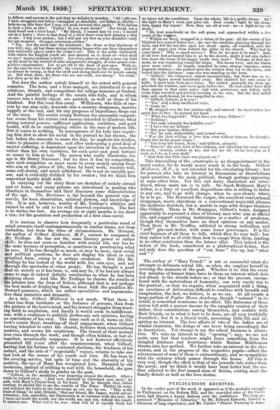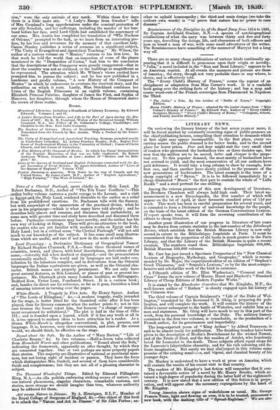PUBLICATIONS RECEIVED.
In the earlier part of the week it appeared as if the probable struggle in Parliament on the Reform Bill, and the unsettled state of the Conti- nent, had thrown a heavy dulness over the publishers. The long-nn- nounecd "Memoirs of Libraries," by Mr. Edward Edwards, himself a librarian of long experience, and Mr. Caird's "Prairie Farming in Ame-
rice," wore the only arrivals of any mark. Within these few days there is a little more stir. " A Lady's Escape from Gwalior" tells of Mrs. Coopland's long apprehensions under the nominal protection of our ally Scindiah, and her sufferings, including the murder of her hus- band before her face, until Lord Clyde had established the supremacy of our arms. Mrs. Austin has completed her translation of "IThe Duchess of Orleans," prompted to the task, as we learn from an interesting pre- face, by her love and reverence for the memory of that excellent lady. Canon Stanley publishes a series of sermons on a significant subject, "The Unity of Evangelical and Apostolical Teaching." Mr. Wilson, the author of a curious volume on " Mexico," returns to his first love. In that work he told the world that an inspection of some of the places mentioned in the " Despatches of Cortes," lead him to the conclusion that the descriptions of the Conqueror were grossly exaggerated—that in short the country was not so civilized, or the buildings so magnificent as he represented. The attention which Mr. Wilson's views excited have prompted him to pursue the subject ; and he has now published in a handsome and goodly volume, " A new History of the Conquest of Mexico" in which he endeavours to overturn the received story, and the authorities on which it rests. Lastly, Miss Strickland continues her Lives of the English Princesses in an eighth volume, containing Elizabeth Princess Palatine, daughter of James the First, and Sophia of Hanover, her daughter, through whom the House of Brunswick derive the crown of these realms.
Boons.
Memoirs of Lihraries; including a Handbook. of Library Economy. By Edward Edwards. Volumes I. and II.
A Lady's Escapefrom Gwalior, and Life in the Fort of Agra during the Mu- tinies of 1857. By R. M. Coopland, Widow of the Reverend George William Coopland, M.A., late Fellow of St. Catherine's College, Cambridge; and Chaplain to the Hon. East India Company.
The Duchess of Orleans. (Helen of Mecklenburg-Schwerin.) A Memoir. Translated from the French by Mrs. Austin. With a Preface by the Trans- lator.
The Unity of Evangelical and Apostolical Teaching. Sermons preached mostly in Canterbury Cathedral. By. Arthur Penrhyn ;Stanley, D.D., Regius Pro fessor of Ecclesiastical History in the University of Oxford ; Canon of Christ Church, and late Canon of Canterbury.
A New History of the Conquest of Mexico. In which Las Cases' denunciations of the Popular Historians of that war are fully vindicated. By Robert Anderson Wilson, Counsellor at Law ; Author of " Mexico and its Reli- gion," &c.
Lives of the Queens of Scotland and English Princesses connected with the Re- gal Succession of Great Britain. B7 Agnes Strickland, Author of " Lives of the Queens of England." Volume %III.
Prairie Farming in America. With Notes by the way of Canada and the United States. By James Caird, M.P., Author of " English Agriculture," " High Farming," " The West of Ireland," &c.
Notes of a Clerical Furlough, spent chiefly in the Holy Land. By Robert Buchanan, D.D., Author of "The Ten Years' Conflicts."—This
bulky volume narrates a yacht voyage to the Levant, and a visit to Egyilttsicokthe Holy Land, rendered desirable to the author as a relief from his proles oval exertions. Dr. Buchanan tells with the fluency, but with somewhat of the mannerism of the practised divine, what he saw in his pilgrimago—which is what many have told already ; and he describes holy places and remains, and discusses their authenticity, as some men with greater time and study have described and discussed them before. Particular, occurrences may have novelty, and the author has his own way of looking at things. These will give an attraction to the book, for readers who are not familiar with modern works on Egypt and the Holy Land; but in at critical sense "the Clerical Furlough" will not add much to our knowledge of the subject. It has some small map illustra- tions which are useful', and rare if not new in the mode of exhibition.
Local Etymology : a Derivative Dictionary of Geographical Names' By Richard Stephen Charnock, F.S.A.—Some three thousand names of countries, towns, and daces, with brief descriptions, derivations of the name,—tolerably full when doubted or disputed,—and the pronunciation occasionally marked. The world and its languages are laid under con- tribution by the laborionta compiler, and in derivations from the Oriental languages the Italian equivalents are given, as well as the Oriental cha- racter. British names and properly preeminent. We not only have great natural features, as Bea Lomond, or places of past or present im- portance. Mr. Charnock gives many London localities, as Billingsgate, Bedford Row, Fetter Lane, Fenehureh Street. It is a curious book ; and, besides its direct use for reference, so far as it goes, furnishes a kind of amusing interest in turning over the pages.
White-Hands. A Tragedy in Five Acts. By Henry Spicer. Author of "The Lords of Effingham," &c.—A modern tragedy, really intended for the stage, is better fitted for the theatrical critic after it has been played, than for literary comment when the author prints it; not in this case because the house reject him, but because "a change of manage- ment occasioned its withdrawal." The plot is laid in the time of Otho III.; and is founded upon a legend, which if it has any truth at all in it, is too opposed to modern ideas to have attraction for a reader. As a drama Whyte-Hands is altogether conventional, in plot, persons, and language. It is, however, very clever convention, and some of the scenes would, we should think, be effective on the stage.
Bound about the Sofa. By the Author of "Mary Barton," "Life of Charlotte Bronte," &c. In two volumes.—Half-a-dozen tales collected from Household Words and other publications, " Round about the Sofa," indicating the framework, apparently an after thought, by which they are connected together. One or two perhaps are more properly papers than stories. The majority are illustrative of national or provincial man- ners, but not losing sight of incident or passion. They have the force which distinguishes Mrs. Gaskell, and several of them have considerable finish and completeness; but they are not all of a pleasing character in subject.
Ten Thousand Wonderful Things. Edited by Edmund Fillingham Xing, M.A.—An olla podrida embracing striking scenes of nature, curi- ous natural phenomena, singular characters, remarkable customs, and stories, more strange we should imagine than true, whatever authority may be adduced for them.
Art versus Nature in Disease. By A. Henriques, B.L.P., Member of the Royal College of Surgeons of England, &c.—One object of this book is to attack the " Nature and Art in Disease " of Sir John Forbes ; an-
other to uphold homceopathy ; the third and main design (we take the authors own words) is "to prove that nature has no power to cure diseases."
.Reminiscences of the Discipline 6.c. of the Royal Navy from 1814 to 1831. By Captain Archibald Sinclair, R.N.—A species of autobiographical recollections of what the navy was between thirty and five and forty years ago, describing the doings, life, and characters of both officers and men on board a man of war, with some small adventures of the writer. The Reminiscences have something of the manner of Marryat but a long way off.
There are so many cheap publications of various kinds continually ap- pearing that it is difficult to pronounce upon their origin or novelty. "Julia," a novel included in the "Run and Read Library," appears to be an American reprint. At all events the manners and persons are those of America ; the story, though not very probable there or any where, is clever, and is effectively told. The "Every Child's History of France," seems the reprint of an abrigdment or adaptation from Miss Corner's work. It is a readable book going over the striking facts of the history ; and has a map and coarse wood-cuts of the French sovereigns from Pharamond to Napoleon the Third.
" The Julia," a Tale. By the Author of " Nellie of Truro." Copyright Edition.
Every Child's History of France : adapted for the junior classes from " Miss Corner's History of France." By Edward Farr, Author of " Every Child's Scripture History," " Every Child's History of Rome," "Collegiate, School, and Family Ancient History."



































 Previous page
Previous page